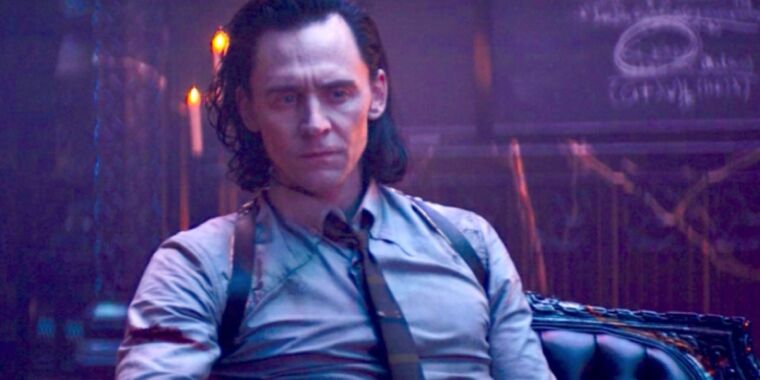Review: Loki’s surprising twists paid off with a major cliffhanger finale
[ad_1]
-
Tom Hiddleston’s Loki runs afoul of the Time Variance Authority (TVA) for creating a “nexus event.”
-
Ravonna Renslayer (Gugu Mbatha-Raw) is a TVA judge who must decide Loki’s fate.
YouTube/Marvel Studios -
Loki joins forces with TVA Agent Mobius M. Mobius (Owen Wilson) to track a dangerous Loki Variant.
-
The animated Miss Minutes, voiced by Tara Strong, was partly inspired by Felix the Cat.
Marvel Studios -
Apocalypses are a fine place for a Loki Variant to hide.
Marvel Studios -
Loki bonds with Sylvie (Sophia di Martino), a female Loki variant.
Marvel Studios -
Sylvie enchants Hunter C-20 (Sasha Lane), who realizes she is actually a Variant.
Marvel Studios -
If the TVA agents are all Variants, and the Time Keepers are animatronic robots, who is really pulling the TVA’s strings?
Marvel Studios -
The pruning of Mobius.
Marvel Studios -
A pruned Loki finds himself in the Void with other Loki variants: Boastful Loki (DeObia Oparei), Kid Loki (Jack Veal), and Classic Loki (Richard E. Grant)
Marvel Studios -
Alligator Loki is the best Loki.
Marvel Studios -
The Lokis have their own hideout.
Marvel Studios -
Hiddleston also portrays President Loki: ambitious, autocratic, and utterly lacking in empathy.
Marvel Studios -
A massive cloud-like monster called Alioth can consume matter and energy—including any Variants sent to the Void.
Marvel Studios
It should be obvious by now that Marvel Studios is leaning hard into the multiverse concept for Phase 4 of the MCU, and the Disney+ series Loki developed that multiverse even further as it concluded its six-episode run this week. Granted, the finale proved to be a bit “talky-talky” and heavy on the exposition. But it ended on one hell of a cliffhanger than sets up any number of tantalizing possibilities for the MCU as a whole—particularly Doctor Strange in the Multiverse of Madness, currently scheduled for release next March.
(Major spoilers for the finale are below the second gallery. We’ll give you a heads up when we get there.)
As we’ve reported previously, the launching point for Loki the series is that scene in Avengers: Endgame when a 2012 version of Loki snags the tesseract containing the Space Stone and vanishes through a portal. Our trickster soon encounters a team of armed guards who “arrest” him on behalf of an entity known as the Time Variance Authority (TVA), the “custodians of chronology” in the MCU, monitoring violations to the Sacred Timeline. Catch the TVA’s attention by trying to change history, and you just might meet the wrong end of the Retroactive Cannon (Ret Con) and have your entire history deleted from the historical timeline.
By using the tesseract to escape his original timeline, this Time Variant Loki has violated the established chronology and is brought before Judge Ravonna Renslayer (Gugu Mbatha-Raw) to answer for his “crime.” But another TVA agent, Mobius M. Mobius (Owen Wilson, wow) intervenes. He wants Loki’s help tracking down another “Time Variant” who has escaped and gone rogue, jumping around through time and disrupting everything by causing so-called “Nexus Events.” And Loki reluctantly agrees to help, albeit with his own agenda. He has his suspicions about the TVA, for starters, and not just because he chafes at their authoritarian approach to maintaining the timeline.
The pilot episode, “Glorious Purpose,” was Disney+’s most-watched series premiere. “[It] did everything it needed to do and did it with a welcome soupçon of whimsical swagger, as befits a trickster god,” I wrote in my review last month. “Whether Loki can develop and sustain this promising start remains to be seen, but I am optimistic that this will be the Marvel series we all so badly want it to be.”
For the most part, that optimism was justified. The remaining five episodes are an excellent mix of action, surprising twists, canny exposition, and intimate character moments, all leading up to the final reveal: what is the TVA’s true nature and purpose, and is there someone (or something) else behind the scenes pulling the strings of the sacred trio of Time Keepers?
(WARNING: Major spoilers below, including for the finale.)
-
More bonding with Sylvie.
-
Loki bids his pal Mobius a fond farewell.
Marvel Studios -
With Loki’s help, Sylvie enchants Alioth.
Marvel Studios -
The clouds part to reveal the Citadel.
Marvel Studios -
He Who Remains (Jonathan Majors), aka Kang, is the mastermind behind the TVA—just as many fans had guessed.
Marvel Studios -
Loki and Sylvie are understandably wary of Kang.
Marvel Studios -
Kang offers the pair an interesting choice.
Marvel Studios -
Sylvie and Loki disagree about the best path forward.
Marvel Studios -
Miss Minutes delivers a message to Ravonna.
Marvel Studios -
Mobius confronts Ravonna about her role in the deception.
Marvel Studios -
Ravonna bests him once again.
Marvel Studios -
Something seems different about the TVA…
Marvel Studios
The show didn’t waste any time bringing on the big reveals. By the end of the second episode, Loki and Mobius had tracked down the dangerous Loki Variant, who turned out to be a woman named Sylvie (Sophia di Martino) with powers of enchantment. There had been much fan speculation as to whether this character would be “Lady Loki” from the comics or the Enchantress. She’s actually an entirely new character with elements of both. Of course, the two Variants find each other fascinating—and, let’s face it, sparks are definitely flying. But Sylvie doesn’t trust anyone, and Loki 2012 is inherently untrustworthy, which makes their slow progression of learning to work together all the more intriguing—and their eventual conflict over a difficult choice heartbreakingly inevitable.
All the best Marvel elements are here, including an incredibly gifted cast, lots of clever Easter eggs, and great production design (check out all that the retro tech). If TVA headquarters reminds you of a Marriott hotel circa the 1990s, that’s because it was filmed at the Marriott Marquis in Atlanta. But what makes Loki really shine isn’t just the stellar individual performances—it’s the chemistry among the co-stars: between Hiddleston and Wilson, to be sure, whose lively banter is a highlight of the early episodes, but also between Hiddleston and di Martino, and Wilson and Mbatha-Raw, whose characters are longtime friends who find themselves at odds over the future of the TVA.
The penultimate episode, “Journey Into Mystery,” was the fan favorite, as Loki gets “pruned” by the TVA and ends up in a place called the Void, where he encounters several other Loki Variants: Classic Loki (Richard E. Grant), Kid Loki (Jack Veal), Boastful Loki (DeObia Oparei), President Loki (Hiddleston), and the unquestioned standout: Alligator Loki. (We even catch a glimpse of Thor as a captured frog, aka “Throg,” whose croaks of rage were voiced by Chris Hemsworth.) The only downside to all those Loki Variants is that we get to spend so little time with them.
Hiddleston’s portrayal of the trickster god in the MCU is so exceptional, it’s almost impossible to imagine anyone else in the role. But the broad appeal of all those Loki Variants is a testament to the enduring power of the mythical figure of Loki through the ages, independent of any single incarnation. Loki is large and contains multitudes. That also goes for the Norwegian supernatural YA series, Ragnarok, in which Jonas Strand Gravli steals scene after scene as a gender-fluid teen named Laurits, who ends up channeling Loki in the show’s second season—even giving “birth” to a tapeworm that seems to be an incarnation of Jörmungandr, the Midgard serpent and arch-enemy of Thor.
It’s Kang
The finale’s big reveal, of course, was the identity of whoever has been controlling the TVA and the Sacred Timeline. It was exactly who fans thought it would be: none other than Kang the Conqueror (Jonathan Majors), already confirmed for Ant-Man and the Wasp: Quantumania—or rather, a Kang Variant known as He Who Remains. Majors (so luminous as Atticus in Lovecraft Country) has the difficult task of delivering a ton of exposition—yep, he’s gotta start monologuing—and it’s to the actor’s great credit that he pulls this off with intelligence and sly wit. His Kang is every inch what head writer Michael Waldron described as a “very charismatic sociopath.”
And yes, there is an end-credits nugget: we see the god of mischief’s case file being branded with a stamp: “Loki will return in season two.” That’s right, as Hiddleston himself previously hinted: we’re getting a second season, which I think is a good call, especially given that cliffhanger ending. WandaVision worked best as a standalone series, and The Falcon and the Winter Soldier, in my opinion, just wasn’t compelling enough to warrant a second season.
But Loki introduced so many elements that it only had time to tangentially explore, mostly because of the need to fulfill its obligation to set up forthcoming films in the MCU’s Phase 4, with the introduction of Kang and the unraveling of the Sacred Timeline. That’s probably my only quibble with the show and why I’m game for more—perhaps a standalone adventure. And maybe someday Alligator Loki will even get his own spinoff series.
Listing image by Marvel Studios
[ad_2]
Source link




